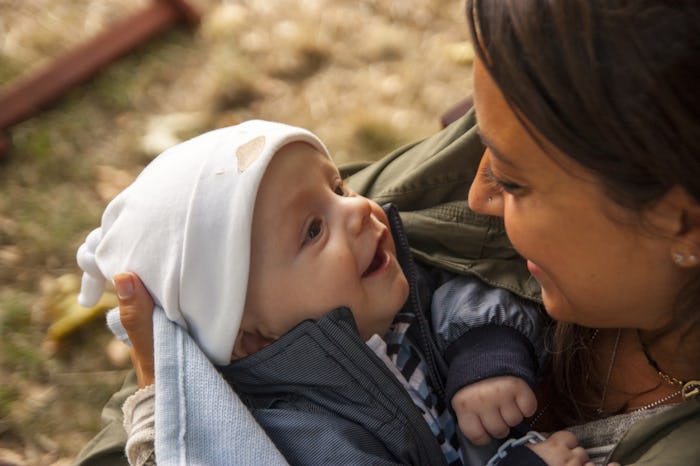Life

Brrr: This Is How Cold Weather Affects Your Milk Supply And Ability To Breastfeed
Does the idea of breastfeeding during the colder months make you nervous?Not only is it uncomfortable to have your nips out in chilly temperatures, but colder weather also brings a whole host of new breastfeeding worries. So knowing how cold weather affects your milk supply can give you some peace of mind during these chillier parts of the year.
For some women, it can seem like your supply is reduced in the cold, but there may be other bodily reactions at work. For instance, a colder body temperature can slow down the body's milk ejection reflex, making it difficult to get the milk out, according to La Leche League International. Even if your supply is fine, pumping or feeding your baby when you feel chilly can feel like your flow is reduced to a trickle. And really, a full supply of breast milk isn't super helpful if you can't get the juices going.
Next, cold weather can decrease milk supply if you get mastitis, an infection of the breast tissue that causes pain, redness, and swelling in the breast area, according to the Mayo Clinic. And dealing with a recent bout of mastitis can potentially cause low milk supply, reports to The Royal Women's Hospital. Unfortunately, mastitis is most common during the colder months of the year, possibly because because of blood vessel restriction in the cold. Whatever the cause, dealing with this condition is problematic for many mothers. Doctor Natasha Burgert writes on BabyCenter that breastfeeding when you have mastitis is safe, and sometimes recommended to clear up the infection more quickly, but it can be a painful experience. If you're dealing with this infection during the colder parts of the year, don't hesitate to visit your physician for advice about keeping the milk supply high.
Another part of the wintry months can make breastfeeding difficult: cold and flu season. Chances are, it seems like everyone and their dog starts getting the sniffles as soon as the first cold front moves in. If you tend to get sick during the winter months, then breastfeeding when you feel like garbage can bring its own set of challenges. In general, it is safe to continue breastfeeding when you have cold or flu symptoms, notes pediatrician Alanna Levine on BabyCenter. Medicating those symptoms, however, can get tricky. In fact, some over-the-counter cold medications contain pseudoephedrine, an ingredient that may decrease your milk production, according to Parents. If you're breastfeeding and dealing with a cold, it's important to talk to your doctor and find treatments that won't harm your baby or your milk supply. Unfortunately, this may mean you're stuck fighting off a nasty cold or flu with nothing more than a neti pot.
Lastly, the cold weather can make breastfeeding uncomfortable or painful in certain cases, even if it does not directly affect your milk supply. Feeling icy air anywhere on your body is uncomfortable, but exposing your nips to cold air is some next-level misery for pretty much anyone. In some cases, however, this discomfort becomes intolerable. The American Academy of Pediatrics reports that people who deal with Raynaud's syndrome of the nipple experience extremely painful breastfeeding in cold temperatures. Because the pain is often severe enough to make breastfeeding impossible, mothers with this syndrome are advised to treat it by avoiding cold exposure. Of course, this is easier said than done in certain environments, but making sure your body is warm before breastfeeding is often the goal. Warm coats, showers, and even gentle heating pads are all your friends. If you suspect Raynaud's syndrome of the nipple — or any other health concern — is making cold-weather breastfeeding too difficult, visit your physician for a check-up and advice.
Check out Romper's new video series, Romper's Doula Diaries:
Watch full episodes of Romper's Doula Diaries on Facebook Watch.